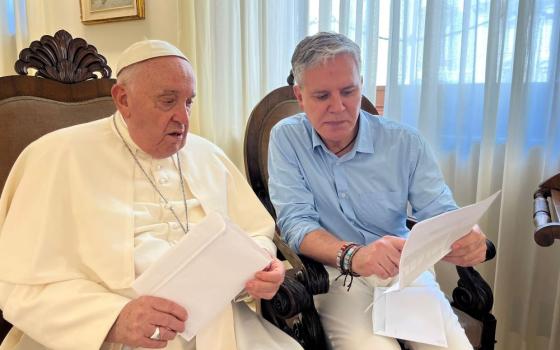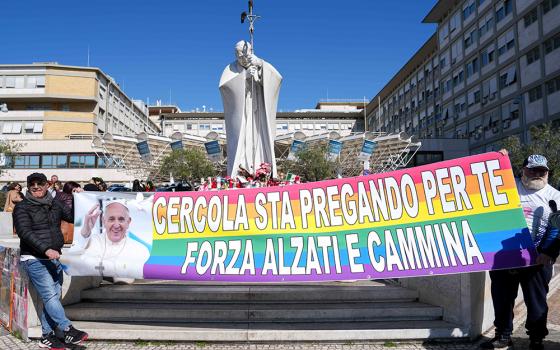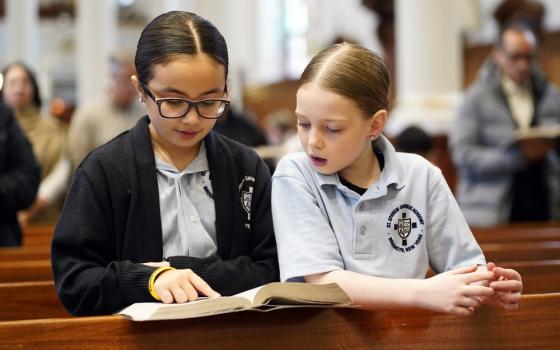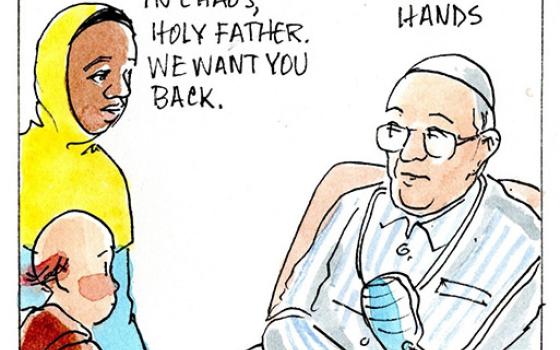
(Unsplash/Ryan Cheng)
"The word of God came to John ... in the desert." That is what Luke said to introduce the prophet who would prepare the way of the Lord. According to Luke, John's ministry was the pivotal point in salvation history; the new and final era was coming into being.
On this Second Sunday of Advent, unless we live in an area such as the Southwest U.S., the desert is probably about as far from our imaginations as a herd of camels. (Now you're thinking about camels, right?) Luke wants us to think about the desert and why John was there instead of protesting around the palace or preaching in the Temple. (John eventually did the first; Jesus did the latter. The results are well-known.)
The desert was Israel's birthplace. God brought the people out of slavery and then led them on a 40-year desert trek to teach them what it meant to be the people of God. They needed that time to get over their servile identity. They lived those 40 years without the distractions of building homes and businesses; that long experience of being on the move taught them to rely on God alone. When they forgot the lessons of the desert, God sent them into exile for 60 years. In both instances, hardship stripped them of everything so that they could figure out what was essential.
We see something similar in the lives of people who suffer. A cancer diagnosis can force people to clarify the purpose of their life. An unexpected death reminds us that relationships are more important than any activity or achievement. A fire or flood often leaves people with a new sense of the relative value of their belongings. An accident often leaves us thinking about how we might have prevented it. All of the above adjust our vision in ways we probably never would have chosen.

(Mark Bartholomew)
So now in December, while everything in the Northern Hemisphere jingles with excitement about winter and holidays, the church invites us into the desert with John.
The desert is the antithesis of the mall. No matter how much money you have, there is nothing to buy. Far from the city lights whose twinkling grabs our attention, the desert allows us to fix our gaze on the stars, on beauty that is beyond our reach, and yet seems to have been created just for our delight. The desert is where our soul finds room to expand, where we can remember what we really thirst for. This is the experience of God's fertile desert. This is the desert we can choose when we want its blessing.
There are other deserts as well, such as the desert of the U.S. southern borderlands where the poor wander, seeking something better as they bet their lives on a chance for peace and safety. There are deserts of loneliness in the midst of bustling cities. The internet allows us to contemplate the desert refugee camps where people spend hours waiting in line for water, and years waiting for a welcome to a new homeland.
These are deserts of desperation, the sort that Israel knew in her exile. Today, these deserts have been created by the selfishness of human sin, and those who suffer in these deserts are not usually the guilty. The promise of today's readings, the promise of Christmas itself, is made for the people in these deserts.
The word of the Lord came to John in the desert, and today he tells us to prepare the way of the Lord.
To prepare the way of the Lord today, we must straighten out the tortured paths that truncate our sisters' and brothers' hopes as they flee for their lives, seeking a safe haven. We are called to straighten out twisted communications with words of truth and sincere compassion, even for our adversaries.
To prepare the way of the Lord today, we need to muster the courage necessary to enter the valleys of depression and desperation that trap our brothers and sisters in loneliness and fear. In our personal relationships, we are called to build bridges across the breaches that have separated us from family or friends, to forget old wounds and bend low enough to say, "I am sorry."
To prepare the way of the Lord today, we must reassess the mountains (and rivers) that create uncrossable borders between us as nations, parties, ideologies, genders, orientations, etc. Then, willing to see the beauty of the other side, we can descend from our heights of righteousness and let those mountains be made low.
There is a lot of geography to cover if we wish to prepare the way of the Lord. But it is all possible because God is already working on it.
[Mary M. McGlone is a Sister of St. Joseph currently writing the history of the Sisters of St. Joseph in the U.S.]
Editor's note: This Sunday Scripture commentary was originally published in the December 2018 issue of NCR's sister publication Celebration, a comprehensive pastoral resource. To read the full version of the commentary, click here. Sign up to receive weekly Scripture for Life emails.
Advertisement






